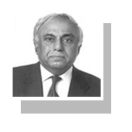By Afshan Subohi
Published in DAWN on January 31, 2022
THE higher 5.7 per cent 2020-21 growth rate will make it a tad harder for Finance Minister Shaukat Tarin and his team to convince the people of their performance by the end of the ongoing fiscal in case there is a major dip in the GDP rate.
Some economists and development partners are already projecting a lower growth rate which might actually go further down post rebasing. Experts are divided on the impact of a higher growth rate on investment. They don’t see the ruling party gaining much political capital from the exercise.
Business circles either do not understand the national accounting practices or are reluctant to make their stance public, preferring to focus on the future and how the government intends to comfort them and calm their anxieties.
“Sudden and abrupt policy changes hurt business confidence more than anything. The withdrawal of tax breaks, amnesties, concessions and duty revisions shook the ground under our feet and disturbed our plans. Instead of focussing on core businesses, we have ended up contemplating the mood and moves of the government.
“It will not be the government but the private sector that will deliver the future in Pakistan by investing, broadening the base of the economy and through job creation. We need sureties regarding policy continuity and improvement in the business environment for problem-free transactions. We don’t care for some academic data exercises or its impact on the past,” a business magnet commented off the record, bitterly hinting at recent IMF-induced measures.
The designation of FY16 as the base year might throw the proverbial spanner in many a work
The experts supported the government’s move to carry out the long-delayed exercise of updating the base year but resented its politicisation.
“All the song and dance about the higher GDP growth last fiscal, attained by updating the base year from FY06 to FY16 may end when the government reports the assessment of the current fiscal in five months before the budget in June,” said an economist, who vouches for the prime minister’s noble intentions. He wished not to be named though.
Noting repeated citations of higher growth data by the PTI leaders, he said: “More than anything, it reflects the government’s desperation to hang on to anything positive to turn the public narrative in their favour. The people’s verdict in the local body elections in KP and the opposition parties’ plans of street protest have together unnerved the PTI government,” he said.
Dr Ali Cheema, an economist associated with the Lahore University of Management Sciences and the Centre for Economic Research in Pakistan, commenting on the prospects of higher investment after the revision of GDP growth rate, said: “The issue is not the growth rate; it is macro stability.” He advised not to read too much in growth rate revision, arguing that the GDP “is not a measure of the effectiveness of government programmes”. He did not see higher GDP boosting the government’s fortunes, reminding that “inflation is the economic measure with political consequences”.
Dr Rashid Amjad, former vice-chancellor of the Pakistan Institute of Development Economics (PIDE) and a member of the government’s economic advisory group, sounded optimistic and talked of a spike in investment while advising one and all to avoid paying heed to speculations of the naysayer.
“Rebasing was long overdue and though new sectors, like IT and food delivery, have been added, it still underestimates the real size of the national economy which to my mind is at least 25-30pc larger.
“That said, a $335 billion economy is a bigger and more attractive market for investors than the one that is worth $275bn if the security situation and, more importantly, the perception of foreign investors also change.
“It helps to identify new emerging sectors. The government needs to build on these new estimates of growth (which was already much higher at 5.4pc than the earlier estimate of 3.95pc even without rebasing and which now stands at 5.7pc) and ignore the pessimistic portrayal of the economy by the media and the opposition.
“A negative impact of rebasing is that it will show a lower growth this year due to a higher base, but the change in GDP composition with a larger share of agriculture and services may still ensure a 5pc growth this year,” he concluded.
Also feeling positive was Dr Ishrat Hussain, a former governor of the State Bank and dean of the Institute of Business Administration who was an advisor to the prime minister on institutional reforms until recently.
“Rebasing is a routine exercise carried out every five years. We have delayed it by 15 years and that is why our data was sub-standard. Rebasing improves the quality as it is based on actual surveys carried out in 2015-16.
“It is more reflective of the reality as it includes new activities and excludes the dead ones. We should now carry out livestock and agriculture censuses which would enable us to draw samples from the surveys of these sectors to incorporate in the next rebasing exercise.”
Professor Abdul Jalil, an economist at PIDE, mentioned the impact of rebasing on GDP ratios in terms of export, education and health that deteriorated further after rebasing. “The size of the economy grew, but the key ratios reflecting the performance of the external sector, resource mobilisation and social services deteriorated. The tax-to-GDP ratio dropped to 9.5pc from 11.1pc and the exports-to-GDP ratio sunk to 7.4pc from 8.6pc. I don’t see how will it help improve the country’s perception”
Experts believe that rebasing has generated space for local and foreign borrowing for the resource-starved government by revising down debt-to-GDP ratio by a good 12pc to 72pc from 84pc of the GDP. The one per cent reduction in fiscal deficit as a ratio of the GDP will provide room for new sovereign guarantees pegged on the economy’s size.
Rebasing of national accounts is a practice to change the reference year for individual price and volume indices and perform aggregation to obtain national account aggregates.
It seems that political rather than economic considerations guided the decision in this regard.
Instead of regular equal intervals of five or 10 years, there have been lapses of 15 and 20 years between rebasing exercises in Pakistan. Over the past 75 years, it has been done seven times; 1949-50, 1959-60, 1980-81, 1996-96, 1999-2000, 2005-06 and the current decision to designate 2015-16 as the base year.




